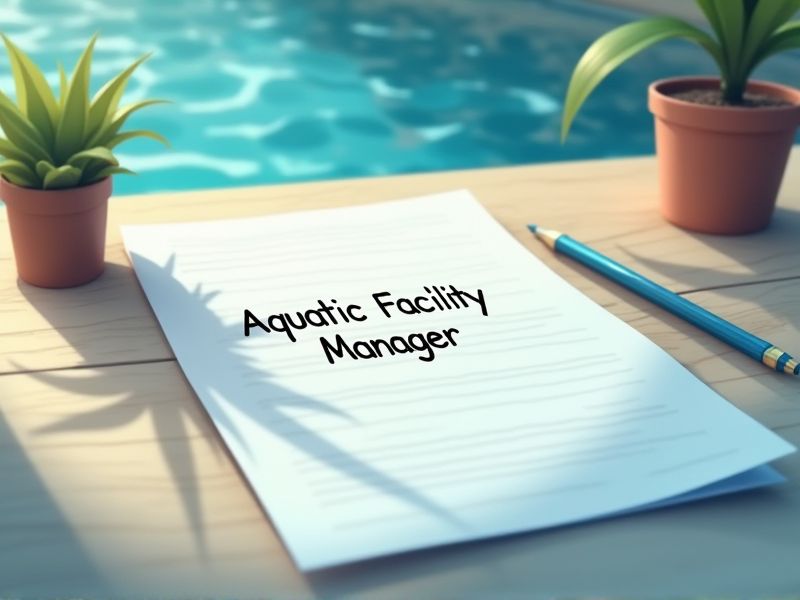
Aquatic Facility Managers oversee complex aquatic environments, ensuring safety, compliance, and operational efficiency. Certain certifications are essential as they validate a manager's ability to handle diverse tasks, from maintaining water quality to implementing emergency protocols. Certifications also enhance credibility and industry recognition, which can be crucial for career advancement. Here are some important certifications necessary for an Aquatic Facility Manager.
Certified Aquatic Facility Manager (CAFM) Certification
The Certified Aquatic Facility Manager (CAFM) certification ensures that an aquatic facility manager possesses up-to-date knowledge of safety regulations, reducing the likelihood of accidents and liability issues. Having the CAFM certification can enhance job prospects, as employers prefer candidates who demonstrate formal training and expertise. The certification process equips managers with skills in operations and maintenance, leading to more efficient facility management. Informed decision-making rooted in CAFM education leads to improved customer satisfaction and facility reputation.
Pool Operator Certification (POC)
The Pool Operator Certification (POC) is needed for an Aquatic Facility Manager to ensure the safe and hygienic operation of swimming pools and associated facilities. POC equips managers with essential knowledge on water chemistry, filtration systems, and sanitation practices, reducing the risk of waterborne illnesses. Compliance with local and national regulations often mandates certification, helping facilities avoid legal repercussions and potential closures. Certification fosters a safer swimming environment, enhancing customer trust and boosting facility reputation.
Water Quality Technician Certification
Water Quality Technician Certification ensures the Aquatic Facility Manager has the necessary knowledge to maintain safe and clean water conditions, reducing the risk of waterborne illnesses. Certification confirms competence in handling chemicals and equipment, promoting efficient and effective facility operations. It informs managers about current safety regulations and standards, aiding in compliance with health and safety laws. Certification boosts facility credibility and trust among users, potentially increasing patron satisfaction and attendance.
Lifeguard Training Certification
The Lifeguard Training Certification equips an Aquatic Facility Manager with the necessary skills to ensure the safety and supervision of swimmers. By understanding emergency response protocols, managers can effectively lead their team during critical incidents. Certification also instills knowledge of water safety regulations, fostering a compliant facility environment. Finally, certified managers can train and assess lifeguard staff, maintaining a high standard of service and safety.
CPR/AED Certification
An Aquatic Facility Manager requires CPR/AED certification to effectively respond to cardiac and respiratory emergencies, which are more likely in water-related environments. Statistics indicate that immediate CPR can double or triple survival chances for cardiac arrest victims, emphasizing its importance. Possessing this certification ensures compliance with safety regulations and liability standards in many jurisdictions. By being certified, the manager sets a proactive safety culture, potentially reducing the risk of fatal incidents.
First Aid Certification
First Aid Certification equips an Aquatic Facility Manager with essential skills to respond effectively to emergencies, reducing the risk of severe injuries. It ensures compliance with safety regulations, which can prevent potential legal liabilities for the facility. Knowledge from first aid training enhances the manager's ability to train staff in emergency preparedness. Demonstrating competency in first aid fosters a safer environment, instilling confidence in patrons using the facility.
Emergency Action and Preparedness Certification
Aquatic facilities face inherent risks such as drowning, making an Emergency Action and Preparedness Certification crucial for effective incident management. Managers with this certification possess the skills to quickly assess situations and implement safety measures, potentially reducing the severity of accidents. This qualification ensures compliance with legal standards, minimizing liability issues for the facility. Proper preparedness training enhances staff coordination during emergencies, leading to a safer environment for patrons.
Hazardous Materials (HAZMAT) Awareness Certification
Aquatic Facility Managers need HAZMAT Awareness Certification to recognize and handle chemical-related risks, as pool facilities frequently involve hazardous substances like chlorine. Proper knowledge ensures immediate response to spills or leaks, safeguarding both staff and patrons from potential harm. Understanding regulation compliance reduces the likelihood of legal repercussions or fines for mishandling hazardous materials. Trained managers contribute to creating a safer environment, which enhances community trust and facility reputation.
OSHA Compliance Certification
OSHA Compliance Certification ensures that an Aquatic Facility Manager is knowledgeable about workplace safety regulations. Adequate training and certification help reduce the likelihood of accidents and legal liabilities in aquatic environments. A well-trained manager contributes to maintaining a safe and healthy environment for both staff and patrons. Proper certification reinforces the facility's commitment to safety standards, potentially enhancing credibility and trust among users.
Facility Management Professional (FMP) Certification
Earning an FMP certification equips an aquatic facility manager with crucial skills in maintenance, operations, and risk management, ensuring safety and efficiency in facility operations. Industry standards often demand specialized knowledge to meet regulatory compliance, which the FMP provides. Enhanced competency through FMP can lead to better job performance and potentially higher remuneration. The certification signifies a professional's commitment to excellence and can increase customer trust and satisfaction.
Summary
As an Aquatic Facility Manager, obtaining certifications can enhance your professional credibility and marketability, leading to increased potential for career advancement. Certifications often provide a deeper understanding of safety protocols and facility management, reducing the likelihood of accidents and legal issues. Customers and stakeholders tend to trust certified professionals more, possibly leading to higher customer satisfaction and facility patronage. Enhanced proficiency can optimize facility operations, resulting in cost savings and efficient resource management.
